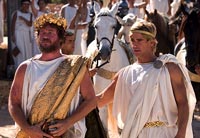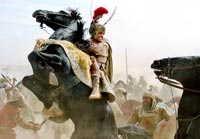Years ago, when I was a teenager obsessed with history, I began to wonder why Christ had come to Earth at the particular time that he did. Why not a century or two earlier or later? I eventually settled on the idea that he had come at the time that would have been most opportune for spreading the gospel—a time after the Greeks had unified many of the world’s cultures and bestowed on them a common language, and a time after the Romans had unified many of the world’s governments. It seemed unfair, then, that the Bible had almost nothing to say about the Greek empire; the Assyrian, Babylonian, Persian and Roman empires all had major roles to play, but apart from an obscurely-written prophetic passage or two, the Greeks fell into that gap between the Testaments.
Likewise, there have been very few films about Alexander the Great and his conquests; the genre of the ancient epic is so dominated by biblical stories that, traditionally, even films that concern themselves with pagan history have been obliged to at least refer to the looming arrival of Christianity in their narration. The last major film about Alexander, which starred Richard Burton and came out in 1956, even tweaked the dialogue in places so that it sounded kind of biblical, and concluded with Alexander becoming a monotheist. But thanks to Gladiator, unapologetically pagan epics are now in vogue, and thus Oliver Stone has finally fulfilled his years-old ambition to commit the life of Alexander to celluloid.

It’s a good thing Troy, another thoroughly pagan Greek story, came out just a few months ago and revived the myth of Achilles for modern audiences, since the historical Alexander evidently fancied himself a descendant of Achilles, and he lived by the same basic principles: live fast, die young, and be famous forever for your glorious deeds in battle. Stone’s film is probably better than Troy, which suffered from pedestrian direction, stilted performances, and a hack musical score that sounded like it was written in a weekend; in place of those things, Stone gives us some truly stirring visuals, music that soars and charges more often than not, and, um, performances that … Well, um, okay, about those performances …
Framing devices aside, the film begins when Alexander is a boy, growing up within a highly dysfunctional royal family. His father, King Philip (Val Kilmer), is prone to drunken rages, and the sight of guests raping slaves of either gender is a not uncommon feature at official banquets. One night, Philip even storms into the bedroom of his wife, Queen Olympias (Angelina Jolie), and tries to force himself on her, oblivious to the fact that their son is right there in the room with them. Olympias, who claims to be descended from Achilles, drives a wedge between father and son by telling Alexander his real father is not Philip, but one of the gods themselves; and although he seems to believe it, the adult Alexander (Colin Farrell) still objects when his father takes another wife and the new in-laws insinuate that Alexander is illegitimate and therefore not fit to inherit his father’s throne.
Here the story lurches ahead rather awkwardly. The story of Alexander is told through the eyes of Ptolemy (Anthony Hopkins), a general of his who went on to become Pharaoh in Alexandria, and who is now dictating the story of their conquests some 40 years later to a scribe in that city’s famous library. This device allows Stone, who wrote the screenplay with Christopher Kyle (K-19: The Widowmaker) and Laeta Kalogridis (TV’s Birds of Prey), to stitch the dramatic episodes together with scenes of long exposition, but at times you scratch your head and wonder just how Stone selected which scenes to dramatize.

In a single speech, Ptolemy casually refers to Philip’s assassination, Alexander’s invasion of modern-day Turkey, his butchering and enslaving of select cities, and his visit to an Egyptian oracle who proclaimed him divine. How did Alexander and his mother react to Philip’s death? Indeed, what role might they have played in it? And what about Alexander’s fateful crossing of the river into Asia—the last time he ever saw European shores? Surely moments like these need a bit of fleshing out; and indeed, Stone does return to one of these events, but in a flashback that appears at an odd moment much later in the film.
The Ptolemy-as-narrator device also allows Stone to glide past the references to Alexander’s more massive acts of brutality, in order that the rest of his film can dwell on that side of Alexander which appreciated foreign cultures. And here his reasons for casting Colin Farrell become clear. Unlike Richard Burton, who, no surprise, had the belligerent drunken arrogance thing down pat, Farrell—who, despite his bad-boy persona, has never really made much of an impression onscreen—has relatively few moments of pointed anger. His Alexander is a much more sensitive character, who spends much of his time either making goo-goo eyes at his male lovers, or trembling and whining about his victimization at the hands of his abusive, negligent father and his domineering, manipulative mother.
Historians aren’t in agreement about Alexander’s sexuality, but Stone has chosen to portray him as bisexual—and at least some historians would agree with that picture. The film depicts a love relationship between Alexander and his best friend, Hephaistion (Jared Leto), but there are no actual love scenes; as noted above, there’s some mushy eye contact and talking about their love, but that’s it. (There is a scene where Alexander kisses a man, though it’s not Hephaistion.)

Alexander’s sexual preferences aside, he’s also depicted as a sensitive warrior. Even his two big battle scenes—one against Persia, the other against India—are portrayed as personal, emotional defeats, even though his army itself was never defeated.
Ah, but those battle scenes are something to behold. The battle against the Persians, full of chariots rushing by and units marching in formation through great clouds of dust, is one of the finer setpieces of its kind, and Stone wisely restrains himself from using the sort of swooping computer-animated aerial shots that have become a cliché since The Lord of the Rings. Rather than show off by bringing us down right into the hand-to-hand combat, Stone uses the technology to give us a sense of scale and a sense of where things are; he even makes significant symbolic use of an eagle that soars over the combat, so that we literally get a bird’s-eye-view of the terrain. Stone also undermines another cliché—the rousing speech delivered by a commander on horseback—by pointing his camera and microphone away from Alexander at times; whether this signifies Stone’s inspired refusal to rouse our bloodthirst the way Alexander rouses that of his troops, or whether it signifies a cynical belief that we don’t need to hear the rationalizations for the bloodshed, just so long as we get blood and guts and plenty of it, the viewer may decide for him or her self.
Alas, the women don’t come out of this film looking all that good. Jolie, faking a sort of east-European accent—which is kind of pointless, since Farrell doesn’t quite tame his Irish brogue, and at least one of Alexander’s generals sounds distinctly Scottish—is constantly seen playing with her snakes, and because it’s the certifiably freaky Jolie playing the role, you may wonder if this was written in the script or if the snakes are just pets that she brought to the set straight from her trailer. Then there is Rosario Dawson, who fakes a sort of South Asian accent as Alexander’s first wife, Roxanne; while Alexander seems to prefer the company of men, he does realize a woman might be useful for producing a son and heir. But despite Stone’s efforts to make Roxanne look “feisty,” and thus strong or powerful or whatever the times demand, Dawson has little to do but expose her body for the film’s wedding-night scene. The high dramatic point for both actresses comes when their characters grab some open doors, fall to their knees, and scream really loud.

The strangest thing about this film is its presumably unintended political overtones; Stone, a liberal who has spent the past few years making documentaries about Fidel Castro, has produced a story that reads like a defense of the Bush administration. Think about it: Alexander swiftly defeats a Middle Eastern army, takes Babylon (or, as we now call that region, Iraq) while the local leader is still in hiding (in a spiderhole, perhaps?), spreads civilization around the globe through force of arms, copes with squabbling generals, and claims to fight for the side of “freedom” while his underlings suggest he is becoming a “tyrant.” He is even motivated by a competitive desire to outdo his father’s rule.
The film tells us, repeatedly, that Alexander will suffer while pursuing his utopian goal of uniting the world, yet it seems to say, through Ptolemy, that Alexander’s loss was everyone else’s gain. Is Stone trying to make a similar point about today’s empires? Maybe, maybe not—and it’s difficult to tell, when the film itself is a bit of a mess. Near the end, Ptolemy says Alexander’s failures towered over other men’s successes, and it’s not too hard to imagine that Oliver Stone might hope that his films will find a similar mixed legacy.
Talk About It
Discussion starters- Philip tells Alexander that people are slaves to Fate and that the gods laugh at us. What would it have been like to grow up with that belief system? How do these myths affect the decisions Alexander makes?
- Aristotle tells his students that Greek culture is superior to that of the Persians because the East does everything “excessively,” whereas Greeks do things in “moderation.” Is moderation always a good thing? Do you think Alexander and his generals are moderate? What about their treatment of slaves and women?
- What do you make of Alexander’s attempts to accommodate Eastern cultures? Is it possible to spread “freedom” and civilization through warfare and bloodshed?
- Alexander says, “Conquer your fear, and I promise you, you will conquer death.” Do you agree or disagree? Why or why not? Is it possible to conquer fear, and if so, how? Do you think Alexander achieves this?
- Is it possible to see God’s hand in historical events such as the spread of the Greek empire? Hebrew prophets such as Jeremiah and Habakkuk talk about God working through the pagan armies of their day. What do you think Christianity would be like if the Greeks had not filled the world with Greek philosophy and the Greek language?
The Family Corner
For parents to considerAlexander is rated R for violence and some sexuality/nudity. The battle scenes are full of stabbings, impalings, spearings, severed limbs, people being shot with arrows and gored on elephants’ tusks and trampled under elephants’ feet, and so on. There are also scenes of people being executed and assassinated apart from battle scenes. Alexander’s bisexuality is frequently hinted at, going back to his teenage years as a student under Aristotle (who preaches the virtues of certain kinds of homosexual relationships), but apart from a kiss and some eye contact, his affairs with men are never really fleshed out; however, there is full female nudity in his wedding-night scene with Roxanne. There are also many references to the gods and myths of pagan Greek religion.
Photos © Copyright Warner Bros
What Other Critics Are Saying
compiled by Jeffrey Overstreetfrom Film Forum, 12/02/04Director Oliver Stone is a sometimes-brilliant troublemaker. Underline “sometimes.”
He’s riled up critics, politicians, and even Christians to both protest and praise his work. He’s made films about controversial wars (Platoon), controversial leaders (JFK, Nixon), and reckless visionaries (The Doors). In Alexander, he has all three interests wrapped up in one movie, starring Colin Farrell as the famous conqueror, Angelina Jolie as his mother, Val Kilmer as his father, and Anthony Hopkins as Ptolemy.
Nevertheless, mainstream critics are almost unanimously sending Stone the same message—in spite of Farrell’s drastic new hairdo, Alexander has failed to conquer the big screen. Religious press critics are similarly disappointed.
Peter T. Chattaway (Christianity Today Movies) says, “Stone’s film is probably better than Troy, which suffered from pedestrian direction, stilted performances, and a hack musical score that sounded like it was written in a weekend; in place of those things, Stone gives us some truly stirring visuals, music that soars and charges more often than not, and, um, performances that … Well, um, okay, about those performances … ” He goes on to talk about how the film is flawed, about its dismaying depictions of women, the historical chapters it overlooks, and a surprisingly timely political subtext.
Gene Edward Veith (World) begins his review by posing “leftist filmmaker” Oliver Stone a question: “If it’s OK for Alexander the Great to conquer Iraq, why is it wrong for George W. Bush?” He goes on to explain: “In his movie Alexander … Mr. Stone praises the conqueror of the known world for his multiculturalism and for promoting a one-world government!”
Veith goes on to say that Stone’s Alexander “displays no charisma or any reason why soldiers would follow him halfway around the world. The movie skips the most interesting parts of his story, jumping from his adolescence to his final victory over the Persians, leaving out everything in between. This is not Alexander the Great. This is Alexander the Awful.”
David DiCerto (Catholic News Service) calls it “bold. Stone has crafted an audacious film, dazzling viewers with epic battle scenes and eye-filling re-creations of splendiferous antiquity, while making sure that the movie’s sweeping scope and din of charging chariots don’t drown out the human drama at its heart. Though Christian viewers may find the film’s brutalities and hedonism (not to mention Alexander’s omnivorous sexual appetites) repelling, they must take into account the pre-Christian historical context of the world in which the events takes place.”
DiCerto also mentions some “epic flaws,” including “interminable pacing, a disjointed script, one-dimensional characters, scene-chewing performances, risibly campy dialogue delivered in an odd assortment of accents … and an overly florid score.”
“Alexander could have been a fascinating historical and social study for both adults and teens,” writes Tom Neven (Plugged In). “But the relative restraint Stone showed in dealing with Alexander’s bisexuality is nowhere in evidence in his handling of rape and battle scenes.”
Annabelle Robertson (Crosswalk) reports that Stone’s version of Alexander “isn’t nearly as good, or remotely as interesting, as the real one.A disappointment, to be sure.”
Chris Monroe (Christian Spotlight) says, “It was surprisingly difficult to find much entertaining here. The fact that it was extremely difficult to sympathize with the characters made it all the more disengaging.”
Michael Elliott (Movie Parables) says the movie “may do more to destroy the conqueror’s legend than all the armies he once opposed. There isn’t much that I can find to recommend about this nearly three-hour debacle.”
Copyright © 2004 Christianity Today. Click for reprint information.












